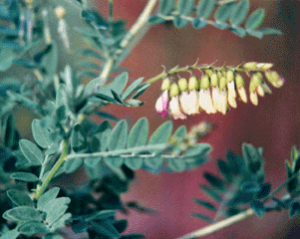Astragalus
(Astragalus membranaceus)
- Alias names for Astragalus: Astragalus membranaceus Family: Leguminosae, Milk Vetch, Huang Qi (Chinese)
- Chinese Name for Astragalus: Huang Qi
References for Astragalus pictures:
About Astragalus: Astragalus has been used in China for thousands of years. The herb is native to northern China. The root is used for medicinal purposes and is collected in the spring after it is 4-7 years old. While there are over 2000 types, the only one that has extensive research on it is the Chinese version. The Chinese name “Huang Qi” means yellow leader because of its importance to Chinese medicine and the color of the root. Also known as “Milk Vetch,” Astragalus is used as food and fodder crops. Astragalus belongs to the Leguminosae family and has seed pods that resemble beans. Hairy stems and leaflets in pairs of 12-18 grow on a 1-2 foot tall perennial plant. The thick, fibrous, medicinal root is yellowish in color and tastes much like licorice.
Actions and Uses of Astragalus:
- Alzheimer’s disease
- Anemia
- Asthma
- Chronic fatigue
- Colds and influenza
- Deficiency of chi (Fatigue and Weakness)
- Diabetes
- Diarrhea
- Fatigue or lack of appetite associated with chemotherapy
- Fever
- Healing skin eruptions
- Heart disease
- Hepatitis
- Improves circulation
- Improves cold resistance
- Increases endurance
- Increases stamina
- Kidney disease
- Kidney problems
- Loss of appetite
- Lowers blood pressure
- Multiple allergies
- Night sweats
- Persistent infection
- Prolapsed organs
- Stomach ulcers
- Uterine bleeding
- Wounds
How Astragalus is used and how it works: Astragalus has an adaptogenic effect that has the ability to both stop a debilitating sweat and produce a therapeutic sweat. The herb helps discharge pus and heals ulcers.
- Astragalus ointment
- Astragalus capsules
- Astragalus root decoction
- Astragalus root tincture
- Dry-fried astragalus root
- Fluid extract
- Powdered root
Parts of the Astragalus plant used: root
Properties of Astragalus: Adaptogenic, antioxidant, antiviral, diuretic, immune stimulant, vasodilator
Chemical Constituents of Astragalus: Asparagines, astragalosides, calcyosin, formononetin, kumatakenin, sterols
Contradictions, safety issues, concerns, harmful drug interactions and allergy precautions for Astragalus: Astragalus has no known serious side effects. If you are pregnant or breastfeeding, do not take astragalus without first consulting an appropriate healthcare professional. If you have an illness that includes a fever, do not take astragalus until you are in the recovery phase of the illness. Astragalus can have interactions with other herbs and the following medications: Antiviral, immune system suppressors, high blood pressure and diabetes medications, diuretics, and anti-coagulants.
Helpful Links and References for Astragalus:
These products are not drugs, but foods for special dietary use pursuant to applicable Federal law. No statement in this page shall be construed as offering these products for the diagnosis, cure, mitigation, treatment, or prevention of any disease.
Related Pages:
